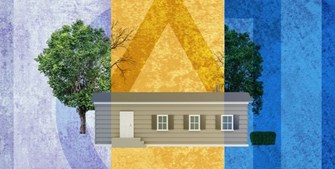Manufactured housing (MH), commonly incorrectly referred to as mobile homes, is an important affordable housing option for low-income families across the nation. However, a recent report from the Consumer Financial Protection Bureau (CFPB) reveals this cost-effective option could have undesired financial consequences. The report, which analyzes new Home Mortgage Disclosure Act (HDMA) data collected from financial institutions beginning in 2018, finds that consumers who choose to finance MH may be subject to higher interest rates, credit barriers and financial risks. Here are some of the key findings:
Loan Applications and Originations
A high percentage of MH loan applications do not result in an origination. In 2019, financial institutions reported that although nearly 420k MH loan applications were submitted, most were either incomplete or denied. Only 27 percent of consumers who applied for an MH loan obtained financing compared to 74 percent for site-built homes, and an estimated 42 percent of MH loan applications were denied compared to only 7 percent of site-built home applications.
Titling and Financing
Manufactured homes are titled as either real property or personal (chattel) property based on whether the owner owns the underlying land. This distinction plays a key role in identifying the financial options available to the purchaser. There are primarily two options: (1) an MH mortgage; or (2) a chattel loan. MH mortgages are secured by the manufactured home and the land, while chattel loans are secured solely by the manufactured home.
Chattel Loans
The HDMA data shows that 42 percent of MH loans are chattel loans. Chattel loans tend to have smaller loan amounts, shorter loan terms and lower processing fees when compared to traditional mortgages. However, chattel loans also tend to have higher interest rates with limited opportunities to refinance. In 2019, when interest rates fell to historic lows, less than 4 percent of chattel loan originations were for refinances compared to 31 percent of MH mortgages and 44 percent for site-built homes. Chattel loans also come with limited consumer protections that, if not fully understood, could lead borrowers down a path of financial uncertainty. Some of the limited protections consist of the following:
- Lack of state and federal assistance: Chattel loans are not covered by the Real Estate Settlement Procedures Act (RESPA), which requires disclosure of pertinent information regarding mortgage loans and settlement costs. As a result, borrowers may run the risk of overpaying and defaulting on their loan. The Coronavirus Aid, Relief, and Economic Security (CARES) Act, and many other state laws designed to safeguard homeowners during the COVID-19 pandemic, is geared towards traditional mortgages and generally does not provide protections to MH homeowners with chattel loans.
- Fewer protections against default: With traditional financing, if a borrower defaults on the mortgage loan, the lender is required to notify the homeowner of an impending foreclosure, allow the borrower time to catch up on loan payments, and must obtain a court order before seizing the property. If a borrower defaults on a chattel loan, there are no foreclosure proceedings and therefore, fewer protections. Depending on state law, the lender or creditor can immediately repossess the home upon default.
- Inadequate land lease regulations: If a manufactured home is tied to a land lease agreement in a state or municipality that does not provide protective rent and titling statutes, the owner may be subject to unreasonable lease terms and rent hikes. Homeowners who are unable to meet the terms of the lease or pay the rent may be subject to eviction.
The HDMA data also reveals that, while 60 percent of MH borrowers directly own the land, 17 percent select a chattel loan. Hispanic, Black and African American, American Indian and Alaska Native, and elderly borrowers are more likely than other consumers to take out chattel loans, even those who own their land. According to the report, chattel loan borrowers generally do not have credit profiles that would prevent them from obtaining a mortgage. In fact, most chattel loan borrowers have similar median credit scores and better loan-to-value and debt-to-income ratios than MH mortgage landowners. So, why do some landowners opt for chattel loans? According to the CFPB’s analysis of the HDMA data, some of the top reasons include:
- Difficulty obtaining a mortgage for a small loan amount
- A dealer, retailer or lender recommends it
- To avoid encumbering the land
- Lowering property taxes
- Manufactured housing is classified as personal property in their state
- Unaware of the downsides of chattel loans
Future Research
The new HDMA data has given the CFPB key insights in understanding MH financing, particularly the financial implications homeowners may face with landownership and chattel financing. Nevertheless, the data is limited in scope and does not provide a full picture of the overall MH market and how it financially impacts consumers. For instance, there is no distinction between new and existing homes, cash purchases are not included, and research regarding loan performance and default risk is omitted.
To fully understand how consumer advocates and policymakers can implement stronger protections that promote financial well-being and racial equity for MH homeowners, the CFPB confirms more research remains to be done.




